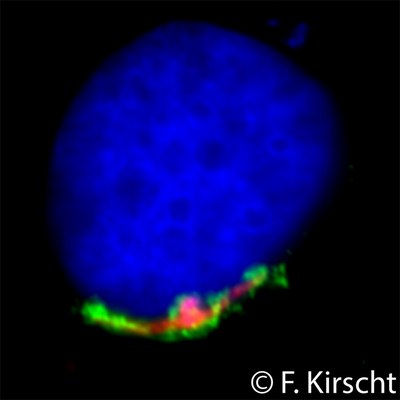Molecular Plasmodium-host interactions
Alyssa Ingmundson, PhD
alyssa.ingmundson@hu-berlin.de
Plasmodium parasites proliferate inside vacuoles in two types of host cells: liver cells and red blood cells. Liver-stage Plasmodium parasites secrete proteins to the parasitophorous vacuole membrane and remodel membranes associated with this vacuole that extend into the host cells. Blood-stage parasites are well known to export a repertoire of proteins into their host cells to remodel the host environment and promote parasite replication. Clearly in both infection stages, molecular interactions between the parasite and host cell are important for infection, and our research aims to understand these interactions. We explore host processes that influence Plasmodium development, and we investigate Plasmodium proteins that are exported to host cell during infection.
Current research projects:
Plasmodium proteins present at the interface with the host in infected liver or red blood cells
Parasite proteins that cross the parasitophorous vacuole membrane can interact with host factors to mediate effects that benefit the parasite. Some of the proteins we are studying are conserved across multiple Plasmodium species and expressed in both the liver and blood stages of infection. With genetics, biochemistry and advanced microscopy, we investigate the role of these Plasmodium proteins that interface with the host to learn about shared aspects of the parasite-host interactions across species and growth stages.
Host factors important for Plasmodium development in the liver stage

Intracellular pathogens can usurp or subvert host cell functions to create an environment that supports the growth and success of the pathogen. Investigating host pathways important for development of Plasmodium in the liver can indicate the requirements for parasite growth in this stage and identify potential therapeutic targets. We hypothesize that the vacuole in which Plasmodium reside intercepts host vesicular transport pathways. We are investigating how regulators of membrane trafficking influence parasite development and the composition of the parasitophorous vacuole in the liver stage.
Egress of liver-stage Plasmodium
When malaria parasites are transmitted by a mosquito, the number of liver cells that become infected is limited, so these Plasmodium parasites will not successfully establish a malaria infection unless they are able to successfully escape the liver and reach the blood stream. The molecular details of how the parasites actively orchestrate this egress process remain unclear, and we aim to better understand this process. We are characterizing a Plasmodium protease important for liver-stage parasite egress and investigating the role of host lipids in this exit process
Current members:
- Florian Kirscht, PhD (florian.kirscht@hu-berlin.de)
- Otto Netzel, PhD (otto.netzel@hu-berlin.de)
- Mattea Scheiner, PhD (mattea.scheiner@hu-berlin.de)
